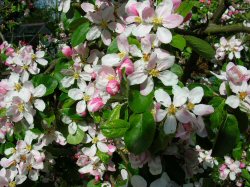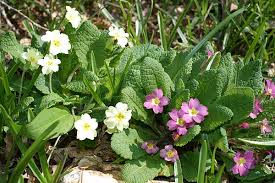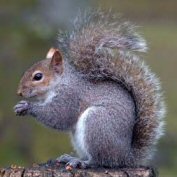Newsletter
Current
Previous
|
December 2014
|
|
|
|
|
If winter comes, can spring be far behind?
 Interpreting this quote from Shelley literally, perhaps it's premature to think of spring, but to plan ahead helps to brighten the lowest point of the year. Interpreting this quote from Shelley literally, perhaps it's premature to think of spring, but to plan ahead helps to brighten the lowest point of the year.
PLANNING AHEAD: Our gardens are a wonderful resource for all kinds of animal life. Taking a leaf out of Earley Town Council's book, who had wonderful public displays this summer, plan an area in your garden for wild flowers or good nectar-producing flowers. Most garden centres sell these seeds. It needn't be a large area, but has to be sunny. A little research will pay dividends later. If you want to identify true native wildflower stock (some is imported), try Emorsgate Seeds. (see details of talk by Grahame Hawker)
YOUR OWN ORCHARD: Maybe you dream of owning an orchard, with daffodils flowering beneath the blossom and, later, juicy fruit in the autumn. If this is a step too far for you, think about joining Jean Hackett on her quest for a community fruit orchard in Earley. The more support she has, the more it will become reality. Just picture the apple blossom in spring, the pleasure of watching the fruit grow, and finally picking it.
WHERE THERE'S BRASS…: The EASI Group and Wokingham Borough Council do their best to keep our streets clean, but have you thought what happened in the past? Read this article to find out.
WHAT PRICE ENERGY?: Coming down to earth with a bump (perhaps an appropriate description), if you want to get up to speed with fracking, read John's account of the EEG talk held on November 17. Another big problem facing the world is population control, perhaps the mother of all our environmental issues. Make a note in your diary for a talk by members of 'Population Matters' on February 23.
|
|
|
|
Community orchard update, 31st October 2014
 The orchard group now has 8 members (or 9, including Grahame), but progress otherwise is slow. The orchard group now has 8 members (or 9, including Grahame), but progress otherwise is slow.
As a result of further contact with WBC, some of us visited the Laurel Park site in August, and identified an area of approx. 40 x 30 metres, in which we planned to plant 32 fruit trees (numbers and types identified by 2 group members). When we sent off these details as requested, we discovered that our contact was leaving WBC in early September, and our information had been handed on to the section manager. Since then, we have been notified that our application is on hold, pending an internal consultation on various requests to set up orchards from other areas in the borough.
On a more positive note, as a result of a decision by councillors to approve an orchard in Earley, 4 of us had a site meeting with representatives of ETC on 24th October, to look at possible sites. In fact, the only 2 considered and visited were Laurel Park and Paddick Drive.
ETC raised several objections to the Laurel Park site, including its seclusion which might lead to vandalism, and lack of air flow: what they did not mention was the fact that there are proposals to extend the Laurel Park car park, to stop footballers using Marefield as an unofficial overflow, but this may be a factor, even though it should be possible to accommodate both extra car parking and an orchard.
The visit to Paddick Drive was more positive, as the space is much more open and is well-used by local residents, so it would be unofficially supervised. ETC lease this land from WBC, and agreed to check the terms of the lease to ascertain whether they could authorise extra planting without having to consult WBC. If this is possible, they felt that we could plant in early 2015, as hoped for originally.
At a post-visit meeting, we decided that we would still like to pursue the idea of using Laurel Park, and would request a meeting with the appropriate WBC department to put our case. We're waiting to hear as I type this. In addition, we will submit a provisional order for the trees on our list.
Photo: Anne Booth
Jean Hackett
|
|
|

Take a walk round your garden and you're walking through history. Many of our much-loved flowers would have been unknown to our earliest ancestors. Just to highlight a few of the earliest introductions:
| Country of Origin | Date of Introduction |
| Bears Breeches | W & C Med. | 1548 |
| Sweet William | S. Europe | c.1220 |
| Pot Marigold | Unknown | c.900 |
| Crown Imperial | Iran to N. India | before 1590 |
| Sunflower | N. American | 1596 |
| Sweet Rocket | C. & S. Europe | c.1300 |
| Lavender | W. Med | c.1200 |
| French Rose | S.Europe to W.Asia | probably C13th |
| Spring Crocus | Italy, Austria, E.Europe | 1597 |
| Tulip (Rembrandt group) | Turkey | 1577 |
| Wallflower | S. Europe | c.1260 |
| Rosemary | Europe | 1388 |
| Peony | S. Europe | c.900 |
| Turk's Cap Lily | Europe | 1596 |
Adventurous plant hunters were responsible for many of these introductions, spurred on and sometimes financed by elite society, who desired to feature unusual plants in their gardens. The advent of printing spread knowledge of flowers, fuelling further interest, and enabled historians to pinpoint early references. Paintings by artists like Hans Holbein also provided information of flowers, which were often arranged in vases.*
 The painting, left, picked up in a junk shop, shows an arrangement of flowers of mixed periods of introduction, but the tulip and peony are featured. The painting, left, picked up in a junk shop, shows an arrangement of flowers of mixed periods of introduction, but the tulip and peony are featured.
The poor, in the meantime, would have their garden herbs, and gather flowers in the wild, often prizing genetic variants that were double or unusual colours.
 |
|
*Reference: Flora Domestica, A History of British Flower Arranging 1500 to 1930 by Mary Rose Blacker
|
|
|
You either love 'em or hate 'em
It has a fluffy tail, children love them and they don't really belong in the UK. Yes, it's the grey squirrel. I have a couple making merry in my garden, and much to my annoyance pinching the crab apples off my tree, planted a few weeks ago. The label assures me these will last all through the winter. I think not.
Remains of our much rarer native red squirrel were present about 7,000 - 10,000 years ago. There were dips in their population through the cutting down of forests for industry, but by the start of the 1900s they had recovered and were shot in the New Forest as timber pests.
 A change in their fortunes came about when a Mr. Brocklehurst released a pair of North American grey squirrels into Henbury Park, which started a trend that continued for nearly fifty years. Of 33 known introductions of the grey squirrel, only one failed to establish. Many greys from Woburn Park were sent all over the place, even to Regent's Park. The red squirrel suffered from diseases which did not affect the grey so badly. The replacement of the red squirrel by the grey is a very complex one to answer, and their interaction is the subject of much research. A change in their fortunes came about when a Mr. Brocklehurst released a pair of North American grey squirrels into Henbury Park, which started a trend that continued for nearly fifty years. Of 33 known introductions of the grey squirrel, only one failed to establish. Many greys from Woburn Park were sent all over the place, even to Regent's Park. The red squirrel suffered from diseases which did not affect the grey so badly. The replacement of the red squirrel by the grey is a very complex one to answer, and their interaction is the subject of much research.  Efforts are being made to protect the red wherever possible. For those of us living in the south, the most likely places you might see a red one are in the Isle of Wight or Brownsea Island. So, like 'em or hate 'em, we're stuck with the grey squirrel in our gardens. Efforts are being made to protect the red wherever possible. For those of us living in the south, the most likely places you might see a red one are in the Isle of Wight or Brownsea Island. So, like 'em or hate 'em, we're stuck with the grey squirrel in our gardens.
|
|
Tree-lovers will be pleased to hear that the management of Redhatch Copse, Earley is to be taken over by Earley Town Council, and it will be in the capable hands of Grahame Hawker.
|
| |
|
UPDATE ON EASI from the November Newsletter
"Although EASI failed to be awarded a Queen's Award for Voluntary Service this year, we are (automatically I believe) being given a second chance next year. Representatives of EASI will therefore soon be 'interviewed' again by representatives of HMQ (or to be more specific, of the Lord Lieutenant of Berkshire). Last time we felt we impressed them -- but however good a report they send in to the central committee, it's the decision of the latter that counts ... anyway, wish us luck. Peter Soul"
|
|
EASI continue their good work of keeping Earley tidy, and we also pay rates to Wokingham Borough Council for this, but, rolling back the years, how were towns and villages kept relatively clear of rubbish?
THE SCAVENGER: When I researched some ancestors in Spitalfields in 1700, I came across old documents called the Spitalfields Rates Book 1700. These detailed payments by individuals and their residence with a Scavenger Rate Summary. The cost of street cleaning was part of the rates and calculated locally, along with the poor rate.
I found the following on a website. From at least Henry VIII's time, all English parishes or boroughs had appointed a person to be responsible for keeping the streets clean: he was called the Scavenger (I wonder if Sonning had one. Ed). In small country parishes the scavenger did the street-sweeping and muck-shifting himself, and often combined the work with bell-ringing or acting as constable. Whatever a Scavenger found was his to keep, or sell. In Worthing (1818), the job was openly auctioned to the highest bidder, so local pickings must have been valuable!
 Even Benjamin Franklin took an interest in street sweeping when he was living in London (about 1750). He paid an old woman one shilling for sweeping the whole street outside his house, then sketched her at work. Even Benjamin Franklin took an interest in street sweeping when he was living in London (about 1750). He paid an old woman one shilling for sweeping the whole street outside his house, then sketched her at work.
 Extract Spitalfields Rate Book, 1700
Scavenger Rate Summary
(click for a larger version) Human waste was dealt with separately. Dog waste (called 'pure') was collected by the poor in buckets and sold to tanneries for processing leather.
|
|
|

 Professor Chris Rhodes, chairman of Transition Town Reading, discussed the options for global and UK energy in the context of declining supplies of conventional crude oil at the meeting on November 17th. Professor Chris Rhodes, chairman of Transition Town Reading, discussed the options for global and UK energy in the context of declining supplies of conventional crude oil at the meeting on November 17th.
Production of 'light crude' oil peaked in 2005. Globally we need to find the equivalent of Saudi Arabia every 3-4 years; half our oil supply will be gone by 2030. Much of the oil left is high-sulphur (sour) and' heavy', needing more costly processing and reducing the 'energy return on investment' (EROI - the ratio of the energy output to energy used to extract and process it).
Fracking - 'hydraulic fracturing' (used both for oil and gas) - involves drilling into shale-rocks and forcing water and other materials down the well at high pressure to fracture the rocks so that the gas can come out relatively freely. This can produce several million gallons of wastewater, containing a cocktail of chemicals, and radioactive elements etc. The gas flow can deplete rapidly - by about 80% over two years - so the well then has to be abandoned or re-fractured. Many wells will be required with consequent local impacts from vehicle movements and drilling sites. There are concerns that the process can contaminate groundwater/air, though there is much dispute. Globally fracking for oil or gas will not be able to supply energy at the rate required to replace conventional oil. Fracking in both Poland and the USA is said not to be achieving the expected amounts of output.
Conventional oil is a key resource - particularly for transportation - and as a chemical feedstock, and for agriculture - and its decline in output is likely to have serious impact very soon. Globally 1,000 barrels of oil - about 160 tonnes - are used every second. Burning oil contributes 30% of all carbon emitted by humans. As oil runs out we will emit far less carbon, but civilization will collapse without alternative fuels. Global population may peak and start to decline over the coming decades.
'Renewable' energy sources will be useful, but it seems extremely unlikely that we can replace oil in the enormous quantity that we use it now - in the UK context the area required for wind-power or biomass would be too great, and proposals for electrification depend on supplies of 'rare earth elements', most of which currently come from China, which is restricting supply.
Biodiesel from algae - solar power by another route - perhaps integrated with sewage/wastewater treatment - has some potential for fuelling transportation which should be explored, but it appears to have a very low EROI compared to conventional oil.
Notes made by John Booth at Professor Rhodes' talk.
Update: In a flagship report produced by Professor Sir Mark Walport, the government's chief advisor on science policy, it is warned that fracking could have serious negative impacts on health and the environment that could last for decades.
("Transition Towns" aim to achieve resilient, more localised communities which avoid the worst potential of peak oil and climate change - replacing the globalised world we live in today.)
|
|
|
NEWS FROM BEYOND EARLEY
Only 97 little vaquita porpoises left: Greenpeace mounted a petition in November to President Peña Nieto asking him to protect the vaquita's habitat. These rare porpoises are similar to little dolphins, and live only in the Northern part of the Gulf of California in Mexico. They're shy and rarely seen - except when they are pulled up to the surface, dead, in nets. Destructive and illegal fishing is responsible for driving the vaquita towards extinction. They're also victims of the illegal trade in health food and Chinese medicine. Poor enforcement has led to rampant illegal fishing for the prized swim bladders of the similarly-sized totoaba fish.
|
|
EARLEY GARDEN SURVEYS
Recent garden survey news from Gillian and Margaret
Looking back to warmer times, in September Margaret noted on Sept 3rd 20 long-tailed tits at 08.30 in a feeding frenzy, a case of safety in numbers with all having an eye for predators.
One 7 spot ladybird on beans.
Gillian noted a distinct absence of harlequin ladybirds this year, and not many 5 spots. She had several night visits from Mr. Fox. In December, listen out for foxes becoming much more vocal, with blood-curdling screams and triple barks in defence of their territory as the mating season approaches.
|
|
|
LOCAL FORTHCOMING EVENTS 2014 / 2015
Monday 15th December 7.30 to 10 p.m. Earley Environmental Group Christmas Social, at the Interpretation Centre, Instow Road. Come along to celebrate the season with music, food and a quiz. Contributions of food and/or drink would be helpful. All welcome.
Monday, 26th January 7.30 to 9.30 p.m. Annual General Meeting followed by a talk by local resident Edwin Trout Earley in bloom: the flora of Maiden Erlegh Nature Reserve. Function Room, Maiden Place Community Centre, off Kilnsea Drive.
Monday, 23rd February 7.30 to 9.30 p.m.Going Green is not enough - the shocking truth about World Population, a talk by Hilde Bartlett and Bill Dowling of Population Matters, an organisation which lobbies for a reduction in the birth rate. We are expanding at a rate of 1 billion every 12 years. We need to ask ourselves what effect that has on our finite world, the animals and plants we share the globe with, the land, the seas, and our own environment? Function Room, Maiden Place Community Centre, off Kilnsea Drive.
Sunday 22nd March HELP (Huge Earley Litter Pick) our annual litter pick. This is in two sessions: 10:00-12:30 and 14:00-16:30. Meet at the Interpretation Centre at Instow Road for each session. Contact Grahame Hawker tel 0118 9868995
Wednesday 1st April Earley's flowering roadside verges - the how and why, a talk by Grahame Hawker, Senior Park Ranger, Earley Town Council about the creation of the spectacular beds of insect-attracting flowers in some of Earley's grass verges. Function Room, Maiden Place Community Centre, off Kilnsea Drive.
|
|
Bits and pieces
Don't forget. We're on Facebook now!
The Earley Environmental Group now has a Facebook presence. We will be using this in addition to the main website, the Yahoo Group and the Newsletter as a way of keeping everyone up to date with our activities and to let you know about upcoming events. Members are also welcome to post news stories or any photographs relevant to the group. If you are a Facebook user, please do join up - just search for 'Earley Environmental Group' and we should pop up. Look forward to seeing you on there. Mel Orros
EASI (Earley Adopt-a-Street Initiative) would like more volunteers. Help keep your street clear of litter. Everything provided. Phone Brian Hackett on 0118 986 1115 or email
Can you offer active help to EEG? If so, phone 0118 962 0004 or go to the website. We would welcome more member involvement. If you have no expertise and would like to get involved, you may be able to give practical help. Perhaps help with distributing the newsletter hard copies, or maybe you have graphic design skills (for occasional posters, leaflets), computer skills, any other skills to offer.
Join the EEG Yahoo Group and post your sightings and messages. You’ll find a link to Yahoo on our website.
EEG committee members can be found on the EEG website, or phone 0118 962 0004
For Wildlife Survey Forms, go to the EEG website or phone Earley Town Council on 0118 986 8995
Comments or contributions to the newsletter to: the Editor or 2 Reeds Avenue, Earley, RG6 5SR. We would welcome short contributions from members to the newsletter.
If you know someone who would like to join EEG, membership forms are available from Earley Town Council, 0118 986 8995, on the website under Downloads , or send an e-mail to the Membership Secretary. Please inform Liz if you intend to change e-mail or address at 50 Kenton Rd, Earley RG6 7LG, or send her an e-mail.
|
SUPPORT YOUR LOCAL SHOPS
Pet Fayre 9 Maiden Lane Centre Lower Earley : A small independent shop, with bird feeders of all kinds, a variety of bird feed, large bags of which the shop is willing to deliver locally, or pick it up in your car from the back of the shop, tel. 0118 9266512, e-mail or go on the comprehensive website
|
|
Thanks to ORACLE Corporation for reproducing our newsletter on recycled paper. Oracle is the world's second largest software company, situated at Thames Valley Business Park in Earley. Oracle UK adheres to the ISO14001 Environment Standard which confirms Oracle has considered and acted upon its environmental impact. As part of Oracle’s corporate social responsibility they support a number of local groups, including us. They have given us valuable support in reproducing the hard copies of our newsletter in colour, as well as printing posters and membership leaflets for us to distribute to libraries, schools etc. |
|